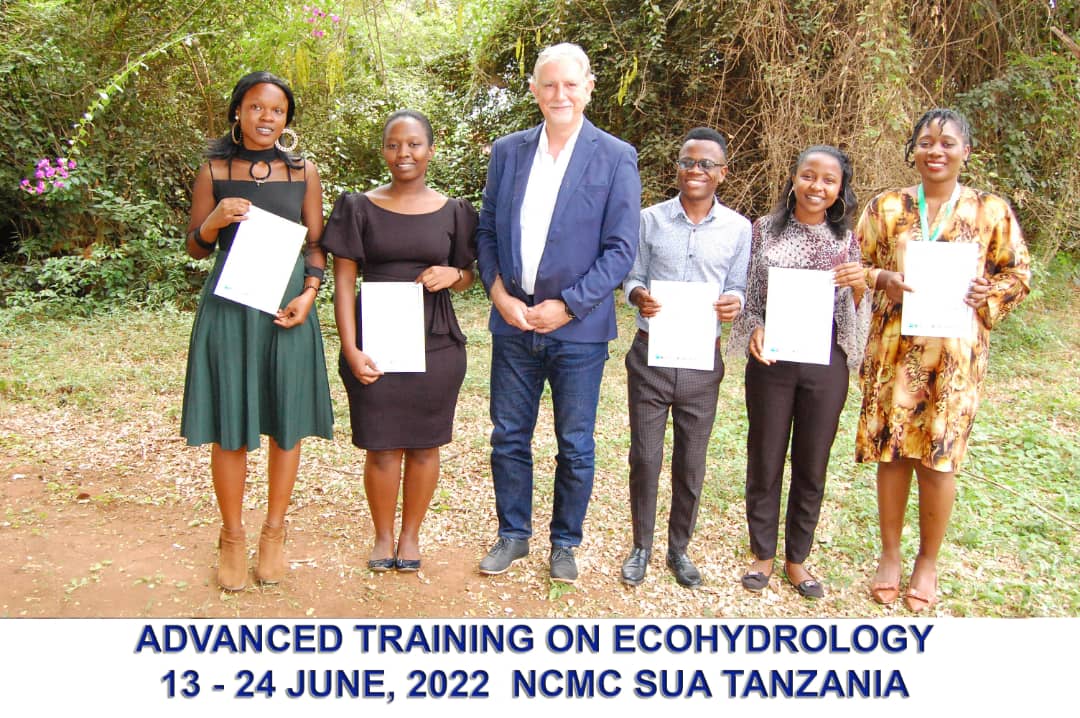Between 13th and 24th, June 2022, the UNESCO Chair on Ecohydrology and Transboundary Water Management of Sokoine University of Agriculture (SUA) organized the “Advanced Training Course in Applied Ecohydrology and Watershed Management in Tanzania”. The two weeks training was conducted at the National Carbon Monitoring Centre, Sokoine University of Agriculture, Morogoro Tanzania.

Group photo at the former iAGRI building where the UNESCO Chair’s office is located
The main focus of this training was to impart knowledge on the practical application of nature-based solutions in solving environmental problems.
The training comprised of:
- Watershed and freshwater management
- River basin conservation and river restoration
- Water quality and river health assessment using macro invertebrates as bi-indicators
- Management of Biosphere Reserves, World Heritage Sites and Geoparks
- Practical application of GPS and GIS in mapping natural ecosystems
- Practical application of environmental impact assessment (EIA) and strategic environmental assessment (SEA)
- Laboratory techniques for water quality assessment: conventional and modern
- Bioassessment; biomonitoring; genomics and bioinformatics
- Preparation of concept notes and project proposals for applied/action research
- Field excursion at Mindu dam reservoir and lab work at Kurwijila Laboratory Premises.
Introduction and course overview
For quite some time majority of conservation organizations have been applying conventional approaches in solving environment problems such as land and natural ecosystems degradation; loss of biodiversity, watersheds and river basin abuse; water eutrophication and wetland alteration, to name just a few. The use of nature based solutions (ecological approaches) is crucial for maintaining the ecological functions of natural ecosystems to provide ecosystem services sustainably.
The objective of the training
The training equipped trainees with practical knowledge of applied Ecohydrology, biotechnology, and watershed management. Trainees were imparted with skills in human-nature relations and how to deal practically with environmental problems for ecological sustainability and societal needs. Participants came from Sokoine University of Agriculture (SUA), University of Dar es Salaam (UDSM), National Environmental Management Council (NEMC), Tanzania Wildlife Authority (TAWA), World Wildlife Fund for Nature Conservation (WWF), Tanzania Forest Conservation Group (TFCG), Tanzania Agriculture Research Institute (TARI) and Mantra Tanzania.
Rationale
The use of nature-based solutions in solving environmental problems is crucial for optimizing the flow of ecosystem services for ecological and societal needs. This is also reflected in the Sustainable Development Goals of the 2030 Agenda which needs a sound problem-oriented scientific background dealing with hydrology and ecosystem sustainability in an integrated manner and a solution-oriented problem solving science (i.e. ecohydrology). This science seeks to understand the underlying water-biota interactions and then to use the ecosystem processes as management tools from molecular to river basin scales.
Ecohydrology also calls for maintaining notions of conservation for pristine ecosystems and expands efforts for regulation of ecohydrological processes at novel ecosystems (human modified) in order to reinforce the sustainability potential (carrying capacity) and to achieve sustainability of water-related ecosystems in terms of water resources, biodiversity, ecosystem services and resilience to global change and anthropogenic stress.
Field work
A field excursion was conducted at the Mindu water reservoir where trainees had the opportunity to observe riparian vegetation Phragmites, Typha, Macrophytes, Elephant grasses, reeds, sedges, etc.
Mindu water reservoir
Trainees were also introduced to water quality analysis techniques at Kurwijila Laboratory, College of Natural and Applied Sciences SUA.
Water quality analysis at Kurwijila Laboratory, CoNAS Mazimbu
Trainees presented group work as part of participatory activities during the training.
Group work presentations
Trainees had the opportunity to be empowered with knowledge of GIS, GPS, and remote sensing
Mr. Yusuph Matembo (Senior GIS expert) demonstrating water resource mapping using GIS.
Ultimately, trainees and facilitators were awarded certificates of attendance and facilitation respectively.

Prof. Luis Chicharo pose for a picture after awarding certificates of attendance
Future plans
Based on the success of this particular training, the UNESCO Chair is working on the next training scheduled to take place in November 2022.
For more information and clarification contact:
Dr. Makarius C.S. Lalika and Ms. Clara Y. Mwasota;
UNESCO Chair on Ecohydrology and Transboundary Water Management,
Sokoine University of Agriculture,
P.O. Box 3038 Morogoro TANZANIA
E-mail: lalika_2mc@sua.ac.tz; clara.mwasota@sua.ac.tz




